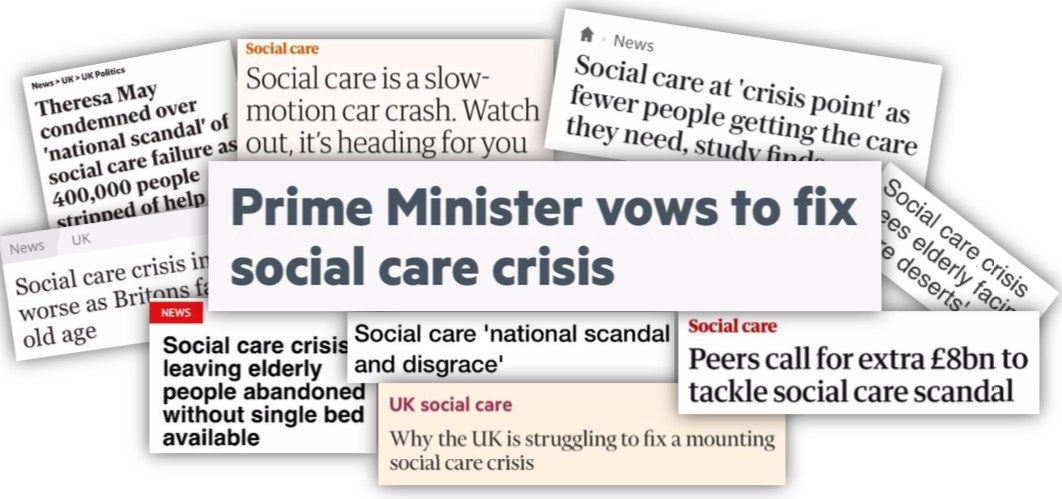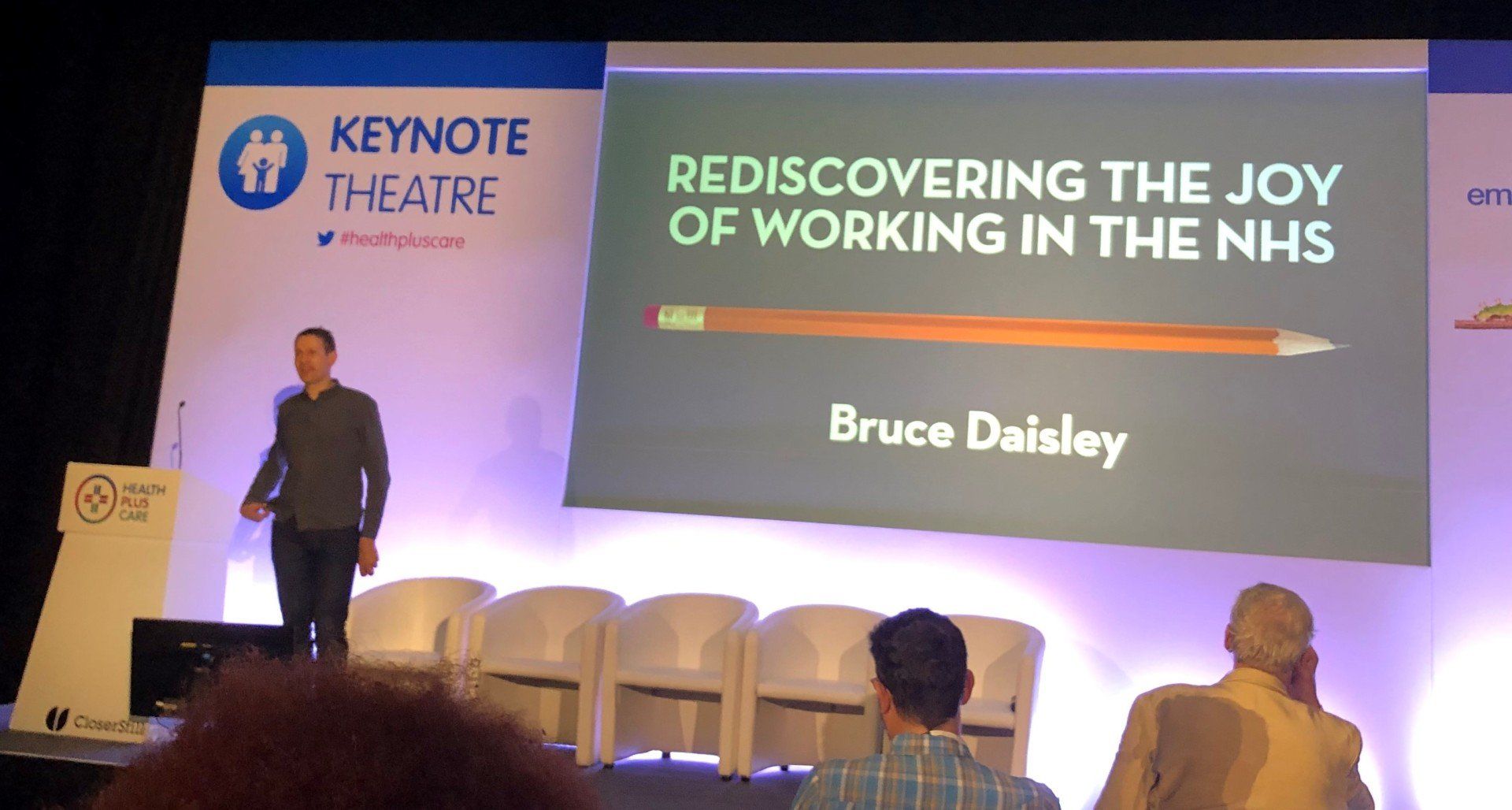Health+Care Conference 2019 - Day 1 Summary
Sophie Chester-Glyn • 27 June 2019
Our summary of a packed Day 1 - in case you missed it
It’s the last week in June, so of course we’re back at the Excel in London for the Health+Care annual conference where professionals from local authorities, NHS, providers and government come together to present ideas, thought leadership and share local initiatives on improving the health and care sector.
Here is my assessment of the first day:
The main themes were technology, social prescribing and more technology. Both of which were being touted as enabling collaborative working and effective care, with the main challenge being changing embedded cultures and habits.
A note from the Minister of State for Health
Caroline Dinenage, Minister of State for Health
The day started off with a keynote address from Caroline Dinenage, Minister of State for Health, who used a great term to point out that health and social care are ‘umbilically linked’ and emphasised the need to ‘blur the boundaries’ between statutory, community and informal care through integration. A big fan of promoting local examples she explained the benefits of the community-based support group ‘Men Shed project’ – a voluntary group of men coming together to support each other through joint interests and DIY, with the knock-on effect of creating friendships and decreasing isolation. Her excitement over Integrated Care Systems (ICS)
and technology, was countered by, what appeared to be an honest frustration at the delayed Green Paper
on social care. Some key messages from her included:
- A report by Department of Health and Social Care (DHSC) on their vision for technology and examples of using HIVE or Centrica technology and smartphones to help monitor and interact with people in their own homes.
- A £5m carers innovation fund, officially announced this month, with the aim of providing 'support for the supporters' to enable carers to stay healthier and happier for longer themselves
Psychological Safety
Later in the morning Bruce Daisley, twitter’s European Vice President turned on the charm with some hilarious cat humour from the twittersphire, but also made an important point about how a person’s mood has a direct effect on how they work. He pointed out that psychological safety, which I feel should and will have an increasing role to play in improving care services, is key to the duty of candour and dealing with errors in care. If anyone needs evidence, he pointed out that research by Amy Edmonson
carried out in hospitals, revealed how safeguarding incidents were more likely to be reported by a psychologically safe team. You can read an article on it here
Lessons from integration - ICSs
At the Integrated Care Services Hub, Henry Ireland
from Imperial College Health Partners
gave what he called ‘boring innovation points’ which were in fact not boring at all. He emphasised the need for transparency from all professionals within ICSs in order for them to work successfully. His points included:
- relationship building
- allowing entrepreneurialism within the team
- shadowing other professionals and
- spending time together
It got me wondering whether the material structures that have been deconstructed in an aim to save costs, such as losing joint working spaces in favour of home-working, have in fact contributed to making ICS operability more difficult?
Also part of this talk was Alan Davies, Director of Digital Health at NW Coast AHSN. It's worth checking out their website as Alan had some interesting reflections into how ICSs change staff behaviours and how, as pointed out by Dido Harding
from NHSE, social care is critically poor at dealing with its customers in comparison to other sectors such as retail.
The Green Paper, Social Prescribing and the Social Value Calculator
Just before lunch, the Residential Care Theatre became packed with care providers eager to get find out the future of social care. The panel consisted of Damian Green, Michael Voges and Paul Burstow. Like Caroline Dinenage, Damian Green expressed frustration at the delayed Green Paper but argued that it required quality public debate which couldn’t happen in the current political climate and should include a cross-party solution. Interestingly, he claimed to favour a model of care funding based on a pension system model.
Even more interesting, Paul Burstow seemed to agree by suggesting a similar solution of an insurance model. Housing with care for Burstow was key, as well as self-directed care. He ended with the question of whether we actually need a Green Paper? In his view the sector has been extremely successful in solving the problems it faces by itself. He pointed out that the Care Act 2014
was a strong piece of legislation that simply needed more funding.
The afternoon started with an important message from Nicky Parker from Manchester City Council on new care models. She pointed out that representing social value was a growing trend for social care commissioning. So if you are tendering for contracts you need to have your organisation's social values policy locked down! In fact 20% of the overall weighting in marking tender submissions is now dedicated to provider's ability to demonstrate their social value impact. The social value calculator
is becoming an increasingly popular tool for local authorities and worth getting to grips with. Local authorities are starting to require new providers to register and actively engage with this new product. This video gives a short synopsis from one company operating a social value calculator.
James Sanderson, Director of Personalised Care at NHS England (NHSE), gave an enlightening representation of transformation in action. Giving people using care services choice and control was key. He advocated the Comprehensive Model for Personalised Care. This included an operating model which comprised of:
- Promoting shared decision-making between medic and patient (of which I’m a big fan)
- Giving people choice – he explained a process which seemed very similar to informed decision-making per Montgomery v Lanarkshire Health Board case
- Holistic care planning
Continuing the social prescribing message, James was a great supporter, especially where it mirrored what was actually happening in the community. His 5 year plan included self-managed support (peer support, health coaching and PAM – Patient Activation Measurement) and being bold in relation to cultural change.
Other Highlights Included:
- David Hambleton explaining how New Zealand's Canterbury model of ‘care alliancing’ means focusing on what is right for the patient rather than the system.
- Raina Summerson, CEO of Agincare, making the great point that private providers (arguably the cornerstone of current social care provision) are currently not invited to strategic discussions around the local development of Primary Care Networks (PCNs) and ICS developments. Something that fundamentally needs to change. A huge elephant in the room.
Simon Chapman and Susanne Cox (NHS England and NHS Improvement)
With a lot of hype around PCNs, my (rather lengthy) last question of the day was to Simon Chapman, Deputy Director for Personalised Care, NHSE. I asked:
‘when pushing for social prescribing, what happens when the community and VCS organisations are oversubscribed? Where does adequate funding come from to support them and how do we ensure that people do not fall through the net? Will the PCN's newly created Social Prescribing Link Workers
have enough capacity?!’
His answer was ultimately - to be honest we don’t know. However, he did make the point that social care needs to look outside of its immediate periphery for funding support. Sport England for example are looking to fund projects
that help people engage with physical activities, Matt Hancock is looking at creating a social prescribing academy
and I later discovered that you can apply for the Evidence Generation Fund
to support digital products.
A great first day, but still so many questions on the other, even larger elephant in the room, also known as funding. Hopefully insights to be had on day 2. Three of us from @manorcommunity attended the conference this year. All three will contribute to an updated post for day two, so keep an eye on our blog page.
ps. don t forget to look out for the launch of the ‘CARE BADGE’!!! ….
Recent Posts

We are pleased to provide an update our involvement in new projects currently being undertaken by Coproduce Care (CIC) in collaboration with Care and Support West. We will be contributing to local initiatives in Social Care Workforce Redesign, and we are excited to share the project with you. This project is running from June 2023 to June 2024. We will be working on three areas for the next 10 months all in the BNSSG region which are as follows: 1: Investigation of the Trusted Assessor Approach in Health and Social Care Systems In this project, we are investigating the Trusted Assessor Approach in health and social care systems. The objective is to demonstrate the value of Trusted Assessors in streamlining care needs assessment, while also addressing data protection and consent concerns. Case studies will be created from local regions that have implemented this approach, to provide insights into the benefits of Trusted Assessors of reducing delays in accessing required care. 2: BNSSG Opportunities for Levy Sharing and Increasing Apprenticeships in Social Care This project aims to identify opportunities for levy sharing in social care and increase the use of apprenticeships. The project will engage social care providers, training organizations, authorities, and other stakeholders to develop strategies, guidelines, and an implementation plan for utilizing the levy effectively and increasing the use of apprenticeships. 3: Integrated Health and Social Care: Enhancing Collaboration, Improving Quality, Shaping Models of Care, and the Future Social Care Workforce In this project, we are evidencing the enhanced collaboration between social care providers, health services, and local authorities. By mapping existing interfaces and collaborations, we seek to identify opportunities for cross-system benefits and improved outcomes, creating recommendations for integration for BNSSG. Our research will provide valuable insights to integration and collaboration between social care and health. At Coproduce Care (CIC), we believe that collaboration and innovation are vital for transforming social care. Through these projects, we aim to contribute to a more efficient and compassionate system. We extend our gratitude to all stakeholders, providers, commissioners, and policymakers for their invaluable support. Thank you for your continued interest in our endeavours. We will keep you updated as the projects progresses! In the meantime, if you are doing any work in any of these key areas, please get in touch with us using the below form. Thank you!

Dear Thérèse Coffey, We wish you the best of luck on your appointment as Secretary of State for Health and Social Care. Coproduce Care (CIC) is a non-profit organisation set up to democratise the social care debate. We support the voices of those working and involved in social care to influence wider decision making in the sector. Through our continued work in this area, we are writing to address some of the urgent needs of our social care workforce. We welcome your plans to set out ‘ Our plans for patients ’ to ensure our population have easier access to NHS and social care services through winter, putting the needs of patients as priority. To ensure we prioritise the health and wellbeing of our populations, and deliver the best, high-quality care possible, we need to ensure we prioritise the needs of our workforce who are at the front of delivering health and social care . To ensure both the health and wellbeing of our population and our social care workforce, we recommend the following: 1. Improving pay for social care workers, in real terms The Kings Fund published a report which compared the pay of social care workers to ten of the largest supermarkets. It found that nine out of ten supermarkets paid more than most social care roles. An example used is that if care worker left their role for a supermarket position at Tesco, they would see a 6.3% pay increase instantly. We have conducted many surveys, webinars, and connected with our audience on what is crucial to improving care workers working conditions and we have found that increasing pay is consistently the most crucial factor in reflecting the value of the work and high stress and responsibilities of the role . With the current cost of living crisis, this need for increasing pay is only getting more urgent. The sector currently has 100,000 vacancies , with extremely high levels of staff shortages. This affects the capacity to deliver services and the quality of care provided . Providers are struggling to recruit staff as they are competing with supermarkets and hospitality, sectors of which offer less stress and responsibility and more pay. We believe care workers are an invaluable part of our society and therefore should be paid accordingly. We recommend: · Introduce national pay scales that ensure care workers meet a real national living wage as a minimum . This will recognise the full contribution of social care workers make to the health of our population, and that their contribution is a real investment into our population. By increasing pay, we further increase recruitment and retention in the sector, and improve the perception of social care being a highly valuable and promising career choice. · Facilitate efforts to develop appropriate distribution of funds. Ensuring the integration and professionalisation of care is fully realised will allow better distribution of funds resulting in higher wages which better reflects the level of skill, qualifications, responsibilities and selflessness required to work within this sector. 2. Professionalising the care system Health and social care should be professionalised to encourage staff retention, career progression and further skill development. Professionalising care work would ensure that those working in the sector are valued and are provided with the necessary tools to provide high quality care. Currently, there is no accredited qualification for social care workers, without a standardised training process. We hosted a live stream with Gillian Keegan , who mentioned the government’s intention to create a voluntary digital care workforce hub, as well as a skill passport for all Health & Social Care workers. This is understood to allow easier identification of the workforce, including the possibility to share resources and opportunities to encourage the workforce to up-skill and develop. The skills passport would help keep track of the skills care workers have demonstrated over time, meaning career progression would be easier to identify . Whilst individual action is very important, to improve the quality of care, we urge for a standardised career and training development program for all care staff that results in an accredited qualification . We recommend: · Adequate pay to restore and recognise social care work as a valued profession . Extensive skills are involved in care work, and if standardised training and qualifications are implemented, security of applicable income is appropriate to these expectations. By increasing pay, care work has higher professional footing as a recognised career and role. · Ensuring the integration of social care is fully realised . The high fragmentation of the care sector and its lack of integration with NHS services makes it challenging to implement standardised training . The governments white paper ‘ Health and social care integration: joining up care for people, places and population ’ seeks the ambition to join up social care services. We welcome this white paper and its integration policy to achieve higher quality of care and better health outcomes. This ambition requires effort and commitment to the integration at all levels, and we hope that as health secretary, fully putting this policy into practice and reaching its scope, goals, and purpose is your focus in your new role. · Implementing standardised training, improved learning outcomes for workers, including IT, literacy, and numeracy training are addressed with sensitivity and with the voices of the workers at heart . Implementing standardised training would ensure a level of professionalism across the sector, however, must go in line with the security of increased income and security of hours of work. We must protect the wellbeing of our workforce, of which is already experiencing burn-out and exhaustion from the high pressures the sector is facing. We cannot have higher expectations of our workers undertaking standardised training without adequate pay . We hope you agree with our recommendations and seek to ensure we continue to improve the working conditions for our social care workforce. We hope that within your post as the new Health and Social Care Secretary, you prioritise the voices of those most impacted by decision making regarding the sector. Thank you for taking the time to read this letter, CoProduce Care Written by: Gabriella Neal







